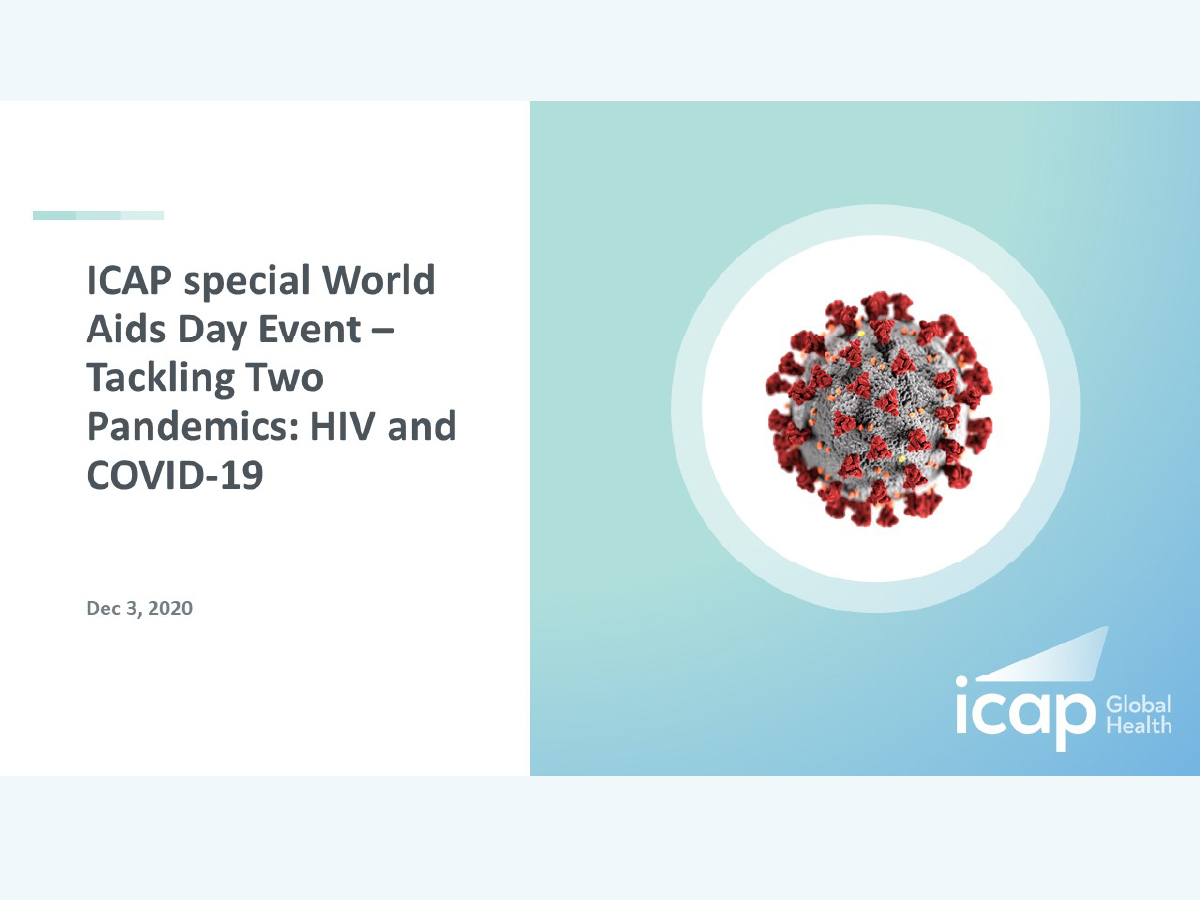As the ongoing COVID-19 pandemic threatens to derail the significant progress made in the quest to control HIV and AIDS, ICAP marked this year’s World AIDS Day by examining the intersection of the two pandemics and the lessons to be learned. In a special webinar commemorating World AIDS Day, ICAP convened global leaders in health to discuss the impact of COVID-19 on the ongoing HIV and AIDS pandemic. The event featured practical discussions on observed and predicted impacts on the HIV prevention, treatment, and care continuum and advocated for the strengthening of health systems for healthier communities.
During a keynote address, Anthony Fauci, MD, director of the National Institute of Allergy and Infectious Diseases, emphasized the outsized impact of the ongoing COVID-19 pandemic, saying: “This is the worst public health disaster and crisis that we’ve had in 102 years with 63 million cases and almost 1.5 million deaths over a period of less than one single year.” He went on to provide a snapshot of the current state of the HIV epidemic in the United States and how the COVID-19 pandemic might impact the national and global fight to end the AIDS epidemic, sharing lessons learned to date and his predictions of what may come to pass in the short term. In closing, he urged attendees “to remember we cannot abandon public health measures such as the simple things of wearing masks, avoiding congregate settings, washing your hands, and keeping distance.”
In a subsequent presentation, Miriam Rabkin, director for Health Systems Strategies and principal investigator of the CQUIN learning network for differentiated service delivery at ICAP, emphasized the outsized impact the COVID-19 pandemic is having on the delivery of HIV services saying, “the immediate and short-term indirect impacts of the COVID epidemic are already being seen. Some services are being cancelled outright to decompress health facilities, reduce crowds, and divert resources to the emergency response. Staff shortages are also a tragic consequence of the pandemic as health care workers fall ill. Closed borders and shuttered production lines have also caused stockouts of medication equipment and supplies are strained in some contexts due to increases in patient load.” She went on to highlight several examples of innovative service delivery from across the CQUIN network to sustain lifesaving HIV services during the COVID pandemic. “Although COVID-19 is likely to have concrete negative effects on the trajectory of the HIV response, the ability of HIV programs to adapt inspires confidence that these negative effects could, with necessary investment, be short-lived.”
Following her presentation, Dr. Rabkin was joined by five other leaders in the global HIV response hosted by global director of ICAP, Wafaa El-Sadr. Other panelists included: Aleny Couto, MD, Director of STI and HIV/AIDS Programs at the Mozambique Ministry of Health; Carl W. Dieffenbach, PhD, Director, Division of AIDS, National Institute of Allergy and Infectious Diseases; Stella Kentutsi, Executive Director, The National Forum of People Living with HIV/AIDS Networks in Uganda; Catherine Ngugi, MPH, MBChB, Head, Division National AIDS & STI Control Program (NASCOP), Ministry of Health, Kenya; and Jawindy Swengbe, Community Education and Outreach Manager, ICAP’s Bronx Prevention Center.
World AIDS Day, observed each year on December 1, is an opportunity for people worldwide to unite in the global response to HIV, show their support for people with HIV, and remember those who have died from an HIV-related illness. With the emergence of a new pandemic that threatens to derail the significant gains made to combat HIV, the work of the global community to stop the spread of COVID-19 and HIV could not be more important.
Explore other recent ICAP webinars
A major global health organization that has been improving public health in countries around the world for over 15 years, ICAP works to transform the health of populations through innovation, science, and global collaboration. Based at Columbia University in New York City, where it is part of the Mailman School of Public Health, ICAP has projects in more than 30 countries, working side-by-side with ministries of health and local partners to confront some of the world’s toughest health challenges. Through meaningful research, tailored technical assistance, effective training and education programs, and rigorous surveillance to measure and evaluate the impact of public health interventions, ICAP aims to realize a global vision of healthy people, empowered communities, and thriving societies.








